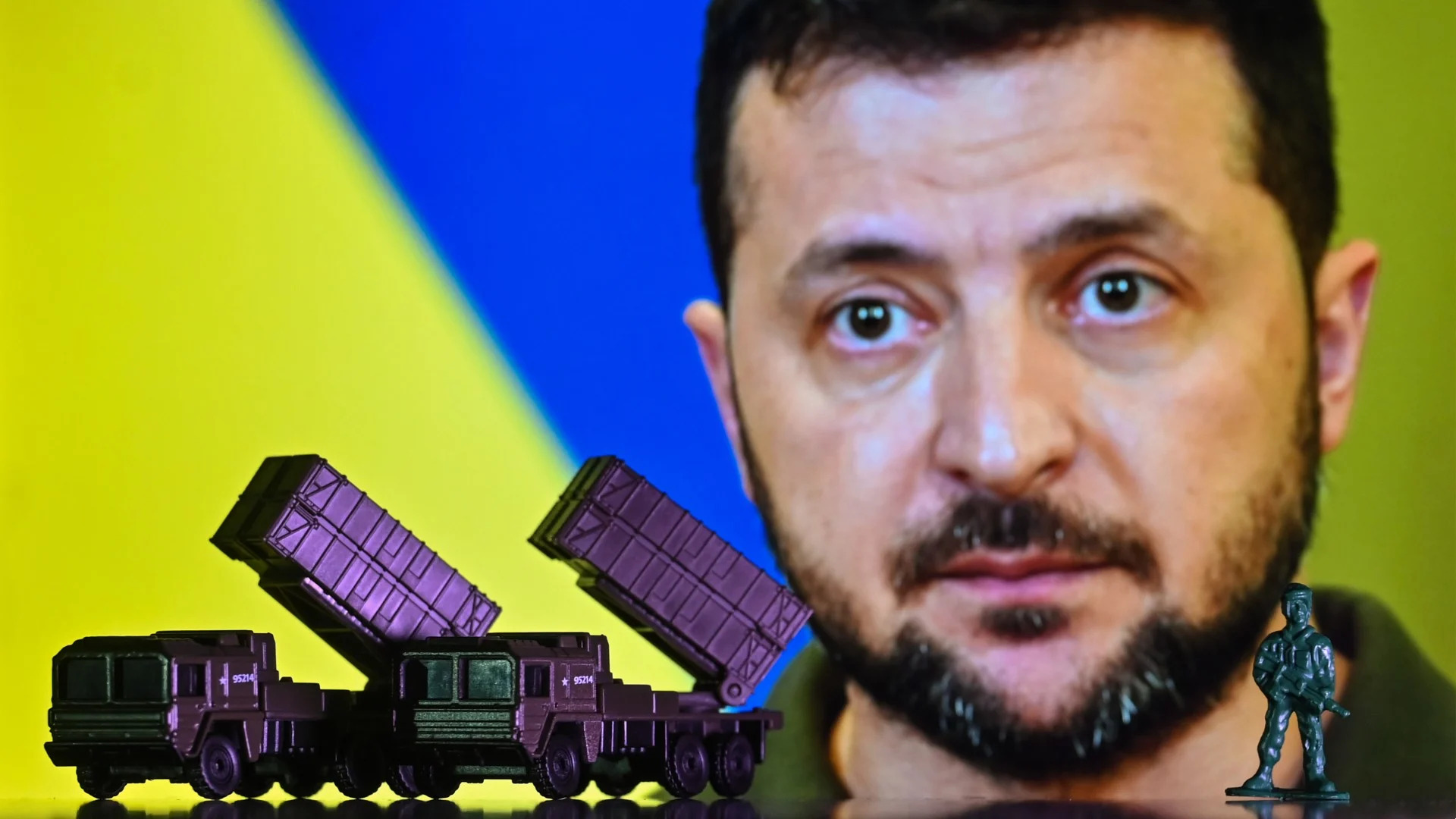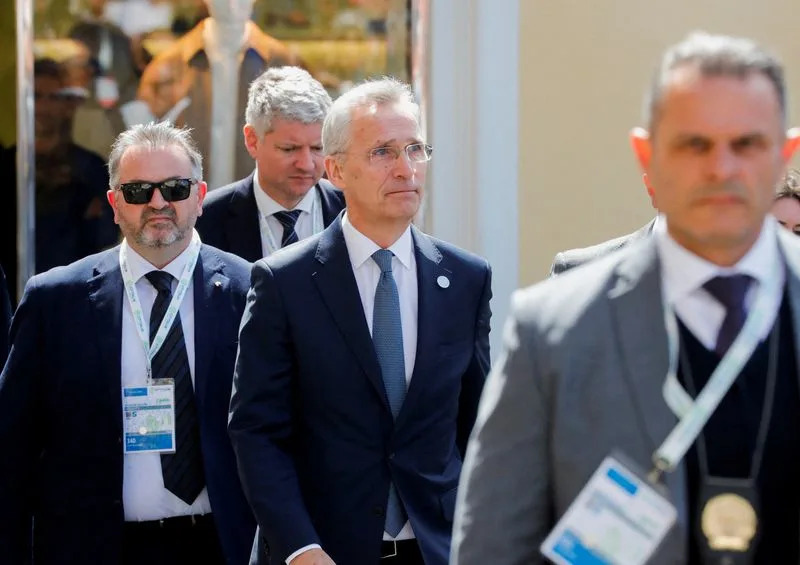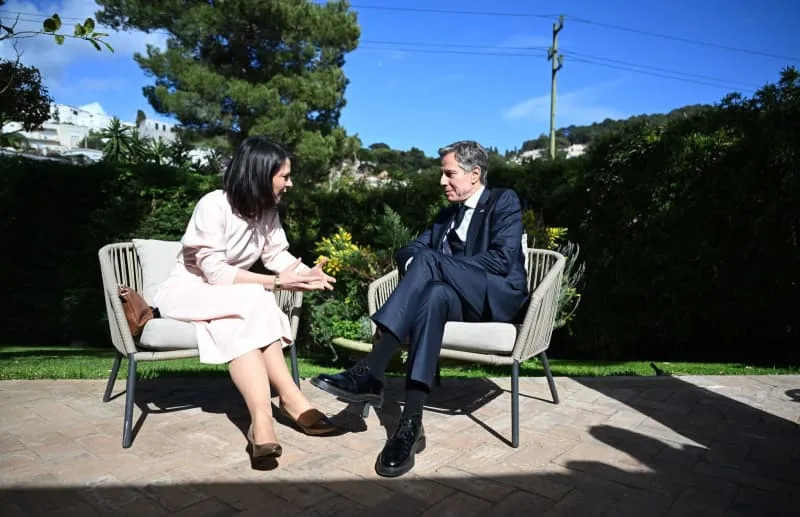Supporters of Ukraine have accused the US and its allies of showing double standards in rushing to Israel's air defence after refusing to intervene in Russian missile attacks on Kyiv for more than two years.
Mini replica of MIM-104 Patriot, a surface-to-air missile (SAM) system, seen in front of a photo of Volodymyr Zelenskiy.
The US, UK, France and Jordan were instrumental in helping Israel to destroy 99% of more than 300 missiles, rockets and drones launched by Iran on Saturday. The "show of airborne prowess" by Western allies and their partners in the Middle East "proved the effectiveness of Israel's missile defence system when combined with some of the world's most advanced aircraft", said Politico. But "it also pointed to a yawning difference in the way Western powers treat Israel compared to Ukraine".
What did the commentators say?
With Ukraine facing hundreds of missile and drone attacks every week, the response by Western allies to the aerial assault against Israel has produced "uncomfortable comparisons", said The New York Times. While Washington and other allies have provided Kyiv with tens of billions of dollars in military equipment and ammunition – including powerful air defences – since the war began, "they have not directly confronted Russian forces".
"It's very stupid; it's hypocrisy," a resident of the embattled Ukrainian city of Kharkiv told the paper. "And it's like some devaluation of Ukrainian lives."
When asked on LBC why the RAF couldn't shoot down drones over Ukraine as they had in Israel, Foreign Secretary David Cameron said that doing so would risk a dangerous "escalation" involving "Nato troops directly engaging Russian troops".
Ukraine's President Volodymyr Zelenskyy countered on X that "Israel is not a Nato member, so no action, such as triggering Article 5, was required" – referring to the Nato provision on collective defence that regards an attack on one as an attack on all. "No one was dragged into the war," he wrote. "They simply contributed to the protection of human life."
Pro-Kyiv supporters argue that Israel's successful defence shows that the key problem for Ukraine is an unwillingness by the West to provide the supplies and support needed to defeat Russia.
But the US has "fundamentally different security relationships" with Israel and Ukraine, said The Wall Street Journal. The hesitancy towards a more combative stance against Russian attacks is "shaped by concerns" that Vladimir Putin "could resort to nuclear arms".
Ukraine is also facing a more capable enemy than Israel, according to Ben Hodges, a former commanding general of US Army Europe."I don't know or believe that Iranian attacks can match the quality or capability of Russian attacks against Ukraine," he told DefenseOne.
What next?
"The Middle East entering uncharted territory (short of full-blown war) is the best that can happen to Putin now," Hanna Notte, a senior associate with the Europe, Russia, and Eurasia Program at the Washington-based Center for Strategic and International Studies, wrote on X.
For the Kremlin, "the potential benefits to be reaped from Iran's attack on Israel are both broad and quite specific", said Radio Free Europe. It firstly "draws attention away from the war in Ukraine at a crucial time when Kyiv is facing major challenges on the front line". And in the context of Putin's claims about a wider confrontation against global liberal-democratic forces, Iran's attack "may play into the Kremlin's propaganda, handing Russia new material it can use to press its public narratives about the war in Ukraine and its showdown with the West".
More specifically, the attack against Israel "adds a new element to the uncertainty over the prospects for long-delayed US aid for Ukraine", said the news service.
The question now for obstructive House Republicans, said The Independent, "is what change this new development has on the calculus around the supplemental aid package meant to bolster the militaries of both Israel and Ukraine".
Amid talk of escalation in both Europe and the Middle East, one key difference between Ukraine and Israel could play into Western thinking: nuclear capability.
"The answer seems to be that the US is desperate to, in its mind, limit the chance of Israeli escalation and is not really that bothered about Ukraine having the ability to escalate," said Phillips O'Brien in the Kyiv Post. "Well, the big difference in escalation concerns is that Israel is a nuclear power and Ukraine is not."
NATO working on more air defences for Ukraine, Stoltenberg says
G7 foreign ministers' meeting on the Italian island of Capri
NATO is working to send more air defence systems to Ukraine, Secretary General Jens Stoltenberg said on Thursday, adding that delays in providing such aid were harming Kyiv's efforts to resist Russia's attacks.
"We have compiled data about the different air defence systems we have in NATO and focused on the Patriot systems. And we are working with allies to ensure that they redeploy some of their systems to Ukraine," he told reporters on the sidelines of a meeting of G7 foreign ministers in Italy.
"We are working at the possibility of more Patriot batteries to Ukraine. We are in dialogue with some specific countries," Stoltenberg said, calling supply of the Patriot "critical" as it is the most advanced defence system the alliance can count on.
Stoltenberg said other defence systems might also be provided to Ukraine, including the NASALS surface-to-air missile system.
"Delays in the delivery of air defence mean that more Russian missiles will hit their targets in Ukraine. Delays in delivery of ammunition mean that Russia will be able to push more along the front line," he added.
Stoltenberg said a meeting of the NATO-Ukraine Council would take place on Friday and that Ukraine's President Volodymyr Zelenskiy was expected to participate virtually.
"I am encouraged by the commitment and the determination by NATO allies to stand up for Ukraine," he told reporters, adding there were encouraging signs that the U.S. Congress might soon unlock an aid package for Ukraine worth $60.84 billion.
Ukraine air defences, Iran-Israel conflict top agenda at G7 meeting
Annalena Baerbock German Minister for Foreign Affairs, meets with US Secretary of State Antony Blinken at the G7 Foreign Ministers' Meeting. Italy is chairing this year's group of seven important Western industrialized nations. The wars in Ukraine and the Gaza Strip are among the most important topics.
Foreign ministers from the Group of Seven (G7) wealthy industrialized democracies gathered on the Italian island of Capri on Thursday amid mounting risks of a broader regional conflict in the Middle East and calls for expanded support for Ukraine.
Further sanctions targeting Iran following attacks on Israel were among the issues discussed by the ministers, as were efforts to prevent further escalation and dissuading Israeli Prime Minister Benjamin Netanyahu from launching a large-scale counter-attack.
Additional military aid for Ukraine, which has been battling against a full-scale Russian invasion for more than two years, is also expected to be a major topic at the two-day meeting.
The host of the meeting, Italy's Foreign Minister Antonio Tajani, assured Israel of his support on behalf of all G7 countries: "We are friends of Israel. We support Israel."
The G7 also includes the United States, Canada, the United Kingdom, Germany, France and Japan. The European Union also takes part in the meetings.
At the same time, he urged both sides to de-escalate. It is feared that a major Israeli counter-attack could lead to a conflagration in the entire region, far beyond Israel's ongoing military offensive in the Gaza Strip that has been going on for six months.
German Foreign Minister Annalena Baerbock also called for a tougher stance against Tehran following the Iranian drone and missile attack on Israel, but has also warned against an expansion of the conflict.
"Iran must be isolated. And at the same time, there must be no further escalation," she said on Thursday on the sidelines of the meeting of foreign ministers from the G7 major industrialized nations in Capri in Italy.
"Of course there must be a response to this unprecedented incident," but a further escalation would be "fatal for the people: in Israel, in the West Bank, in Lebanon, in the entire region," Baerbock said.
NATO Secretary General Jens Stoltenberg and Ukrainian Foreign Minister Dmytro Kuleba are also expected to attend the meeting in the afternoon.
Better air-defence support for Ukraine is expected to be on the table in the wake of massive Russian air attacks on Ukraine.
Kuleba said he met US Secretary of State Antony Blinken on Thursday and discussed in detail efforts to secure additional US-made Patriot air-defence systems and missiles as quickly as possible.
Baerbock said she planned to discuss further Patriot systems for Ukraine during her one-to-one meeting with Blinken.
Kuleba also appealed to US lawmakers to swiftly approve an additional Ukraine aid package, which has been blocked by the Republican opposition for months.
The US House of Representatives is expected to finally vote on the $61 billion package on Saturday.
The European Union's top diplomat, Josep Borrell, on Thursday also urged swift action to provide Ukraine with air defences, saying help is urgently needed to prevent Russia from destroying Ukraine's electricity infrastructure.
Borrell said that EU countries must not rely on the US, but demonstrate their own strength and take responsibility for arming Ukraine directly: "We have Patriots. We have anti-missile systems."
Borrell also urged strict implementation of sanctions on Iran for delivering drones to Russia. Russian forces have made extensive use of Iranian-made drones in attacks on Ukrainian cities.
The G7 foreign ministers' meeting, like all such major diplomatic summits, is taking place amid tight security. More than 1,300 police officers and other security forces are deployed on the island in the Gulf of Naples to protect the ministers.





